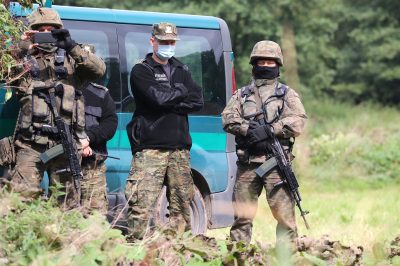
A Filipino national, a legal partner of a Pole under the UK law, has been refused entry to Poland by border officers. Both men live together in the UK. The Provincial Administrative Court in Warsaw heard the complaint against the Border Guard’s two decisions and made a ruling revoking both of them. The court held that the border control authorities had failed to appropriately examine the personal situation of the complainant in accordance with the relevant laws.
The HFHR joined the case pending before the PAC as a community organisation. The Foundation submitted an opinion persuading the Court to refer a question for a preliminary ruling to the European Court of Justice. Under the European law, domestic courts unsure of the interpretation of Community laws are obliged to refer the question about the contentious issue to the ECJ for a preliminary ruling.
“Revocation of the decision is not enough. Poland has failed to implement the provision of the ‘Free Movement’ Directive which would facilitate entry of a partner of an EU citizen irrespective of the fact that Polish law does not recognise civil partnerships. We still do not know the criteria guiding the Border Guard’s review of the personal situation of a foreigner travelling with his or her partner, an EU citizen, performed upon their entry into Poland”, says Karolina Rusiłowicz, a lawyer with the HFHR.
According to the EU law, Poland should facilitate the entry of a partner with whom an EU citizen has a duly attested, durable relationship. To this end, the state must undertake an extensive examination of the personal circumstances related to the entry and appropriately justify any denial of entry of the partner. Still, the provisions of the EU Directive offer no clear explanation of the above facilitation obligation, hence the need for the ECJ’s interpretation, all the more required in the absence of relevant domestic regulations.
The HFHR is already involved in a case regarding the same issue. The PAC in Warsaw revoked the Border Guard’s decision issued to S.V., a Dominican national. The Foundation points out another question to be resolved, namely whether the Border Guard may, in certain situations, allow the entry of an EU citizen’s partner rather than justify a refusal.
“Obviously, a situation like the one present in this case would not happen if Poland recognised civil partnerships as equal to marriages and thus removed unreasonable obstacles in the movement of couples who contracted civil partnerships”, notes Dr. Dorota Pudzianowska, HFHR.
In the proceedings before the PAC the complainant was represented by Mr Marcin Górski of the Law Offices of Tataj, Górski Adwokaci, acting pro bono.


